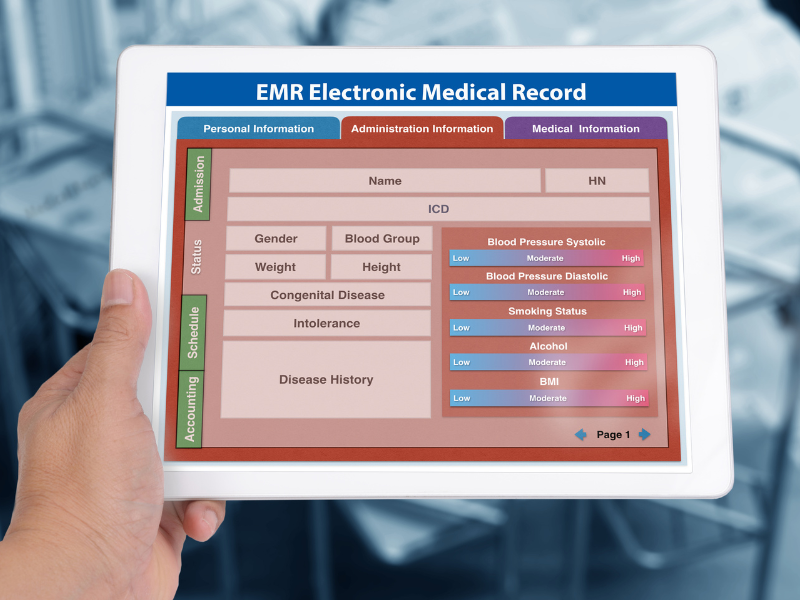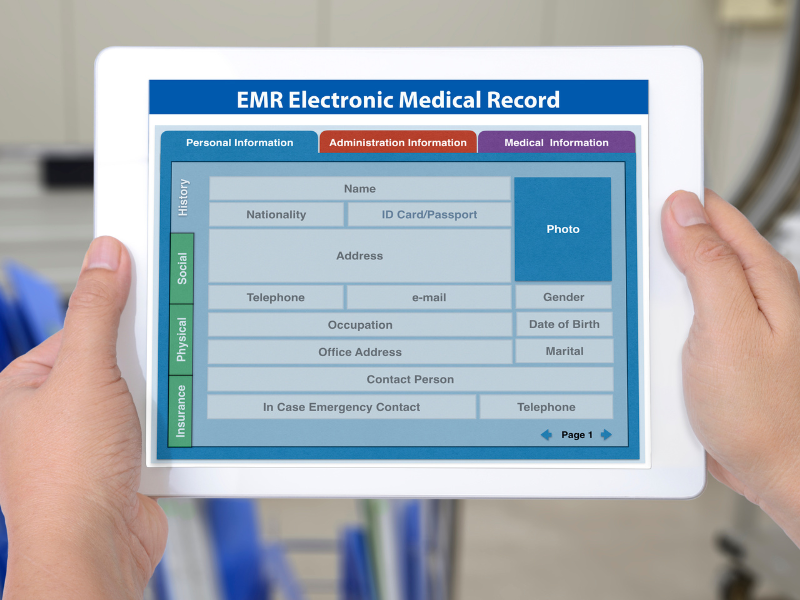What is an EMR system, and do you need one as a healthcare provider? This article provides an overview of its definition.
You will also learn the benefits and key features of EMR systems, taking note of their potential challenges when choosing one that would best suit your organization’s unique requirements.
Table of Contents

What Is EMR? Understanding the Basics
What does EMR stand for? EMR means electronic medical record system. The Agency for Healthcare Research and Quality defines EMR systems as digital copies of patient health information that authorized healthcare professionals and staff can create, collect, manage, and access within a healthcare organization. They offer many advantages to doctors, clinics, and other healthcare organizations, significantly improving medical record-keeping processes.
Medical records are usually kept in paper format. However, with increasing digitization in healthcare, EMR systems have become more popular. Unfortunately, despite their benefits, EMR adoption is still slow in the US. A recent survey cited by the AHRQ shows that only 4 percent of ambulatory physicians use a fully functional EMR, while only 13 percent use a basic system.
Benefits of EMR Adoption in Healthcare
Now that you know the meaning of EMR, let’s discuss its benefits to healthcare professionals and organizations.
Enhanced viewing of medical records
EMR viewing features make patient charts more accessible, organized, and legible. Doctors and healthcare staff can quickly find the needed information, leading to better patient care. The more clinical data they see, the higher quality of care they can provide. Additionally, transitioning from traditional paper records to electronic ones saves time and resources, reducing the need to search, pull, and file physical charts.
Accurate and accessible medical data
Electronic medical records ensure that healthcare staff can take accurate and consistent documentation of patient data. Doctors can rely on precise and up-to-date information and make better-informed decisions for patient care. This becomes crucial in ambulatory settings, allowing doctors to access and update patient records quickly and remotely, making it easier to coordinate care.
Time and cost savings
Moving from traditional and handwritten notes to electronic documentation is not just about modernizing. Adopting EMR systems is a practical step that saves both time and money. Instead of relying on dictation, doctors can directly type their notes in the electronic system. This eliminates the need for additional transcription staff or services.

Significant Barriers to EMR Adoption in Healthcare
Research published in Health Affairs and the Interactive Journal of Medical Research identifies several barriers to EMR adoption:
High upfront financial costs
One major hurdle is the substantial upfront financial investment required for EMR implementation. The financial strain is particularly challenging for solo and small practices where a majority of US physicians operate. Moreover, many small practices grapple with rising business expenses and the threat of being absorbed by larger healthcare organizations.
Uncertain financial benefits
The uncertainty surrounding the financial benefits that can be gained over time adds to the hesitation. Practices experienced varying financial outcomes, with some seeing significant benefits. Others faced decreased revenue during the transition period.
High initial time costs
Implementing EMRs demands more time from physicians at the onset. This leads to extended workdays or reduced patient visits during periods when staff undergo EMR system training. However, as mentioned, the time savings are significant after the initial phase.
Physician resistance
Physicians harbor apprehensions and distrust toward EMR technology. There is a prevailing culture of resistance that EMRs may challenge their autonomy as decision-makers in patient care. They may feel like a “novice” in technology even while being an “expert” in healthcare.
What EMR Systems Are the Best?
EMR systems have numerous benefits to medical practices. Choose vendors that can help you address your barriers to EMR adoption. Here are some of the top-rated HIPAA-compliant EMR systems today based on Capterra reviews, which are manually verified:
- Praxis EMR
- ClinicSense
- ChiroSpring
- Jane
- TherapyNotes
- ChiroFusion
- IntakeQ
- Kipu
- TriMed Complete

Key Features and Factors to Consider When Choosing EMR Systems
Data Ownership
Determine and clarify ownership of patient medical records with your EMR vendor. Failure to establish ownership could harm patients in terms of care continuation, disability claims, and other issues. Physicians face increased liability if defending against medical malpractice claims without proper medical records.
Operational support and customer service
Operational problems may render physicians unable to respond effectively during system failures or unexpected circumstances like natural disasters. The vendor should have a data loss and recovery system in place. Ideally, they should store data in secure facilities and provide accessible customer care 24/7.
Confidentiality and security
An EMR system should have safeguards for maintaining medical record confidentiality, security, and integrity. Physicians must understand where EMR data will be stored, who has access, and for what purpose, complying with HIPAA and HITECH laws. Choosing a vendor with HIPAA-compliant features like access controls, audit logs, and data encryption would be ideal.
What Is EMR’s Role in Transforming Healthcare?
EMR systems play a vital role in enhancing the quality, efficiency, and accessibility of patient services. While there are barriers to EMR adoption, the initial investment in time and cost will eventually lead to long-term benefits.
By digitizing patient records, EMR helps healthcare staff swiftly access and exchange information and enables more effective decision-making. Now that you know what EMR systems are, their benefits, and their challenges, choosing a vendor with quality features could significantly impact your organization’s efficiency and overall healthcare outcomes.







